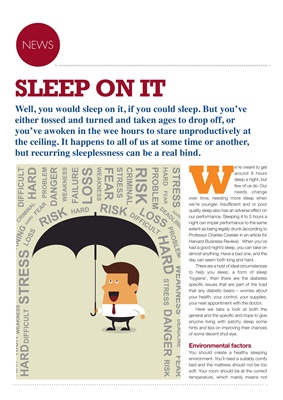
LIVINGLIVINGNEWS
SLEEP ON IT We're meant to get
around 8 hours
sleep a night, but
few of us do. Our
needs change
over time, needing more sleep when
we're younger. Insufficient and or poor
quality sleep also has an adverse effect on
our performance. Sleeping 4 to 5 hours a
night can impair performance to the same
extent as being legally drunk (according to
Professor Charles Czeisler in an article for
Harvard Business Review). When you've
had a good night's sleep, you can take on
almost anything. Have a bad one, and the
day can seem both long and hard.
There are a host of ideal circumstances
to help you sleep, a form of sleep
'hygiene', then there are the diabetes
specific issues that are part of the load
than any diabetic bears - worries about
your health, your control, your supplies,
your next appointment with the doctor.
Here we take a look at both the
general and the specific and hope to give
anyone living with patchy sleep some
hints and tips on improving their chances
of some decent shut-eye.
Environmental factors
You should create a healthy sleeping
environment. You'll need a suitably comfy
bed and the mattress should not be too
soft. Your room should be at the correct
temperature, which mainly means not
Well, you would sleep on it, if you could sleep. But you've
either tossed and turned and taken ages to drop off, or
you've awoken in the wee hours to stare unproductively at
the ceiling. It happens to all of us at some time or another,
but recurring sleeplessness can be a real bind.